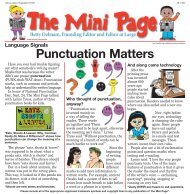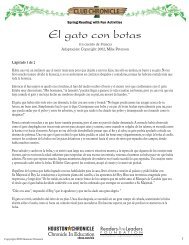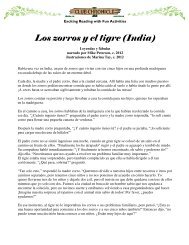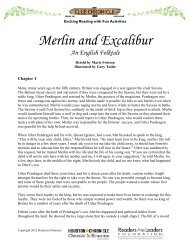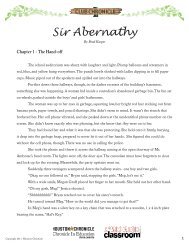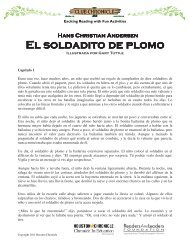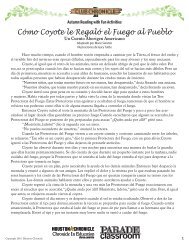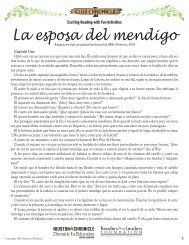The Presidential Election 2012 The Presidential Election 2012
The Presidential Election 2012 The Presidential Election 2012
The Presidential Election 2012 The Presidential Election 2012
Create successful ePaper yourself
Turn your PDF publications into a flip-book with our unique Google optimized e-Paper software.
<strong>The</strong><br />
<strong>Presidential</strong><br />
<strong>Election</strong><br />
<strong>2012</strong><br />
A Hot Topics Hot Serials Supplement From
EVERY FOUR YEARS:<br />
THE AMERICAN<br />
PRESIDENTIAL<br />
ELECTION<br />
WASHINGTON COMES ALIVE!<br />
It’s a brisk January day in 2013 and Washington, D.C., is alive with crowds and<br />
excitement. All eyes are on 1600 Pennsylvania Ave. It’s inauguration time – meaning<br />
that a President of the United States is about to be sworn in. Many people believe the<br />
President to be the most powerful person in the world. What we know for sure is that<br />
the next president will be the leader of a country over 300 million people and will have<br />
awesome economic capabilities, incredible technology, and a myriad of immense<br />
social and political problems. <strong>The</strong> job is certainly one of the most difficult jobs on<br />
earth. Why would anyone want that job What exactly is the job What preceded the<br />
new president’s journey to the inauguration What are the pressures that will make his<br />
life easier or harder What does it mean to be “President of the United States”<br />
This special newspaper section will address those questions. We’ll look at the role of<br />
the president – the president’s jobs, responsibilities, and challenges. We’ll also look at<br />
how one gets to be president, from caucuses and primary elections to national conventions<br />
and campaigns. We’ll examine what the Constitution says about the presidency,<br />
from what the president can and cannot do to exactly how the president gets elected<br />
(it’s not the way you might think). So, come along. <strong>The</strong>re’ll be questions, profiles,<br />
quizzes, and interesting trivia.<br />
WHO CAN BE PRESIDENT, ANYWAY<br />
Quiz: Qualifications for the Presidency<br />
Every four years, dozens of people decide to run for the presidency. <strong>The</strong>y come from<br />
a variety of political parties, philosophies, and parts of the country, and they meet the<br />
qualifications for becoming president. But what are those qualifications What does it<br />
take to be eligible to run for the presidency <strong>The</strong> Constitution of the United States sets<br />
forth those qualifications in Article II.<br />
From the list below, put a check next to each of the<br />
qualifications that you believe are in the Constitution.<br />
Paul Hakimata Photography/Shutterstock.com<br />
µ college graduate<br />
µ at least 35 years of age<br />
µ married or engaged<br />
µ Christian<br />
µ male<br />
µ lawyer or businessman<br />
µ held political office<br />
before<br />
µ be a naturalized or<br />
U.S.-born citizen<br />
µ live in the United States<br />
µ have lived in the United<br />
States for at least<br />
14 years<br />
µ high school graduate<br />
2 Credits: Written by John Colgan-Davis • Edited by Ken Bookman • Design by Gilbert & Associates © Copyright Hot Topics Publications <strong>2012</strong>
<strong>The</strong> <strong>Presidential</strong> Requirements<br />
<strong>The</strong> Reasons for the Rules<br />
<strong>The</strong>re really are only three official qualifications to be President of the<br />
United States. A president must be 35 by the time of the inauguration,<br />
have lived in the United States for at least 14 years, and be a naturalborn<br />
citizen of the United States. This may seem strange now, but if you<br />
look at the United States in 1787, when the presidency was designed, it<br />
makes sense. Constitutional government was a new idea. <strong>The</strong> founders<br />
of the country wanted the head of this new government to be someone<br />
old enough and experienced enough to have made difficult decisions<br />
and demonstrated responsibility in his life. <strong>The</strong> natural citizenship<br />
requirement came about because the United States was a new country<br />
that was born in conflict. <strong>The</strong> founders wanted to be sure that a president<br />
would not have split loyalties between the United States and the<br />
country of his birth. That’s also the reason why they wanted someone<br />
who had lived in the United States for at least 14 years. He would be<br />
familiar with the country he was to lead and its issues and needs.<br />
Of course, people consider<br />
other qualifications when<br />
voting for president. <strong>The</strong>se<br />
might be called the “unofficial<br />
qualifications” – the<br />
things that individual voters<br />
think are important. Most of<br />
our presidents, for example,<br />
have been married. And all<br />
of them have been men.<br />
Many people think we’ll see<br />
a woman president soon.<br />
Hillary Clinton came close to<br />
being the Democratic nominee<br />
in 2008 and some think<br />
she'll be a contender in<br />
2016.<br />
Michael Rubin/Shutterstock.com<br />
LEARN MORE!<br />
A. What “unofficial qualifications” do you think are the most<br />
important ones for a candidate to possess Review the list of qualifications<br />
above and indicate those that you would consider. If something you<br />
think should be there isn’t, add it. <strong>The</strong>n write a paragraph about your three<br />
most important “unofficial qualifications,” explaining why you think each is<br />
important. Compare your responses with the responses of other students<br />
in your class. Finally, check the Help Wanted ads in the E-edition or printnewspaper<br />
to see how they are written. Write one seeking a new president,<br />
including the qualifications you think are most important.<br />
B. Interview an adult over 25. Write down that person’s list of the most<br />
important “unofficial qualifications” for president. Ask that person to rank<br />
them in order of importance. Compare that list to yours. Is there anyone<br />
in today’s newspaper that you think would make a good president<br />
Common Core Standard: Draw evidence from informational texts to support<br />
analysis, reflection, and research.<br />
3
<strong>The</strong> Most Powerful<br />
Person in the World<br />
Believing that the president is that powerful implies that the president can do just about anything.<br />
But is that really the case What limits are there on a president’s powers What is the president forbidden<br />
to do Below is a list of powers that are available to the federal government under the<br />
Constitution. Indicate which ones you think the president has the constitutional right to do:<br />
Evan Meyer/Shutterstock.com<br />
4<br />
Part I – Legal Powers<br />
Put a check next to all of the following that are legal powers of the President of the United States:<br />
A . ______ can approve a treaty with a foreign nation<br />
B . ______ can approve a budget for the United States<br />
C. ______ can declare war<br />
D . ______ can declare a national emergency and temporarily suspend (cancel) the Constitution<br />
E . ______ can approve a judge and appoint him or her to the U.S. Supreme Court<br />
F . ______ can impose a tax on a product for sale in the United States<br />
Part II – Miscellaneous<br />
Followings are some miscellaneous questions about the presidency.<br />
A . All eligible voters who vote in a presidential election elect the president.<br />
True or False<br />
B . <strong>The</strong> president and vice president must be from the same political party.<br />
True or False<br />
C . A person may serve no more than two terms (eight years) as president.<br />
True or False ___________<br />
D . What is the title of the appointed advisers to the president who head government agencies such<br />
as the Justice, Treasury, and Labor Departments ______________________<br />
E . If the president and vice president are both too ill to serve or both die, the President of the<br />
Senate becomes the acting president. True or False ___________<br />
F . If Congress passes a law the president doesn’t like, there is nothing the president can do about<br />
it. True or False ___________<br />
G . <strong>The</strong> president can never commit U.S. military forces to action without the approval of Congress.<br />
True or False ___________<br />
H . <strong>The</strong> president can appoint anyone to be a federal judge.<br />
True or False. ___________<br />
I . Each January, the president must make a State of the Union Address to the American people,<br />
explaining the economic condition of the country and the president’s goals.<br />
True or False ___________<br />
J . <strong>The</strong> president can be removed from office before his or her term is over.<br />
True or False ___________<br />
Answers:<br />
Part I<br />
Each item in Part I should be unchecked.<br />
<strong>The</strong> president does not have the sole power to take any<br />
of the actions listed.<br />
Part II<br />
A. False. <strong>The</strong> candidate who gets the votes of the most<br />
people in each state wins all the electoral votes from<br />
that state with rare exceptions. Nationally, the number of<br />
people who vote for a candidate doesn’t count.<br />
B. False. <strong>The</strong> electors of the Electoral College cast separate<br />
ballots for president and vice president, so it is<br />
technically possible for them to be of different parties.<br />
C. False. A person can serve only two terms but with a<br />
total of ten years. That is, if someone were to take office<br />
in the middle of a previous person’s term, he could<br />
serve as long as two years and then be elected to two<br />
terms.<br />
D. Cabinet is the term for the appointed advisers, each<br />
of whom is called Secretary, as in Secretary of State,<br />
Secretary of Defense, etc. except for the Attorney<br />
General.<br />
E. False. Congress determines by law who becomes acting<br />
president and it is the Speaker of the House.<br />
F. False. <strong>The</strong> president can veto a bill, but if Congress<br />
votes by a two-thirds majority to override the veto, the<br />
bill becomes law anyway.<br />
G. False. Under the War Powers Act, the president can<br />
commit U.S. forces to action for 90 days without congressional<br />
approval. At the end of 90 days, Congress<br />
must approve the action, or else it must be halted.<br />
H. False. <strong>The</strong> Senate must approve federal judicial nominations<br />
but the president can make temporary appointments.<br />
I. False. <strong>The</strong> State of the Union Address or report must<br />
be made to Congress, even though it is now broadcast to<br />
the American people.<br />
J. True. A president may be impeached, (put on trial)<br />
and, if found guilty, removed from office.
Power and Protection<br />
Check your answers.<br />
Which ones were correct and which were wrong Are you<br />
surprised <strong>The</strong> Constitution limits the powers of the president.<br />
<strong>The</strong>re are many things that leaders in other nations<br />
can do that our president cannot do. Why do you think this<br />
is so Why are the president’s powers so defined and so<br />
limited<br />
Think back to 1787. Many Americans were afraid of an<br />
executive and a national government with too much power.<br />
Remember that they had come from Britain -- a country<br />
ruled by a king -- and they didn’t want to live under similar<br />
rule. <strong>The</strong>y didn’t want an all-powerful ruler, so the framers<br />
of the Constitution included a number of protections against<br />
that. <strong>The</strong> president’s power is defined fairly clearly and it is<br />
limited in scope.<br />
Also note that the president, as the head of the executive<br />
branch of the government, along with the other two branches, cannot take any one civil action alone. Congress can pass a bill, for example,<br />
but the president must sign it into law. <strong>The</strong> president is the commander-in-chief of the armed forces, but he must ask Congress for a declaration<br />
of war. This idea is known as separation of powers – a system under which each branch of the government has its own separate role in making<br />
the government work.<br />
Finally, there are checks and balances, meaning that each branch<br />
oversees the actions of the other branches of government. Congress<br />
can pass a bill, but the president may veto it. If the president vetoes a<br />
bill, Congress, with a two-thirds majority, has the option to override<br />
the veto and pass the bill anyway, making it a law. Congress can pass<br />
a bill and the president can sign it into law, but the Supreme Court,<br />
if asked, can declare that law unconstitutional, rendering it invalid.<br />
<strong>The</strong>se checks promise a fairer system by preventing any one branch<br />
of the government from exerting too much control over the system.<br />
This is a unique feature of the United States system of government.<br />
LEARN MORE!<br />
<strong>The</strong> framers of the Constitution didn’t want the all-powerful rule of a king.<br />
What are some of the differences between countries ruled by elected officials<br />
and countries ruled by royals or dictators Find an example in today’s E-edition<br />
or print newspaper of an undemocratic country. Find details in that story that<br />
would not be found in a story about a democratic country.<br />
Common Core Standard: compare and contrast<br />
5
A Day in the<br />
Life of the<br />
President<br />
RESPONSIBILITIES<br />
OF THE PRESIDENT<br />
<strong>The</strong> president’s powers may be limited under the Constitution, but there still are<br />
plenty of things a president can do. Most are important and necessary to the functioning<br />
of the country. You may have the impression that all the president does is<br />
participate in meetings to solve problems and address crises. While much of the<br />
president’s job is like that, there are many tasks that may seem downright mundane<br />
and boring. Following is a typical day in the life of a modern president. Although the<br />
beginning and end are likely to remain the same, most events in between will vary<br />
from day to day.<br />
6:30 a.m.: Awakened by guard, the president showers and dresses.<br />
7:50 a.m.: Breakfast with spouse.<br />
7 a.m.: Watches television news and scans the morning<br />
newspapers.<br />
7:30 a.m.: Assistant brings preceding day’s<br />
Congressional Record, with pages marked for attention.<br />
Appointments secretary gives briefing on day’s<br />
schedule.<br />
8:15 a.m.: Arriving at office, the president rapidly reads a 30-page notebook of<br />
news clippings and commentary from around the country and makes notes for<br />
staff.<br />
8:25 a.m.: Telephones the Budget Director to express concerns about press<br />
reports that the proposed budget soon to be unveiled publicly does not provide<br />
enough tax relief to married couples with children in school.<br />
8:35 a.m.: Personal secretary brings documents to be<br />
signed and a few selected letters. <strong>The</strong> president signs<br />
the documents, reads the letters, and dictates answers.<br />
8:55 a.m.: Meets with four congressional leaders of<br />
own party to discuss strategy for passing a particular<br />
bill.<br />
9:20 a.m.: Receives award from National Audubon<br />
Society for efforts to preserve nesting grounds for wild birds. Photo opportunity.<br />
9:35 a.m.: Phones (1) a Senator recovering from illness to wish her a rapid<br />
recovery; (2) a labor leader, whose union is on strike, to express hope for a<br />
quick settlement to lessen the economic impact; (3) the Director of the Office of<br />
Management and Budget with a specific question about the budget.<br />
10 a.m.: Two defeated Representatives of the president’s party come to ask<br />
whether there are any jobs for them.<br />
10:20 a.m.: Phones the Secretary of Education to ask about the status of an<br />
education bill.<br />
10:30 a.m.: <strong>The</strong> new American ambassador to Sweden stops in to say goodbye<br />
and to ask whether there are any special instructions.<br />
10:45 a.m.: Gives a short speech and presents the Purple Heart award to the<br />
families of five soldiers killed in a military action. Photos are taken.<br />
11:15 a.m.: Special Assistant for National Security summarizes the status of four<br />
international crises.<br />
11:50 a.m.: Lunch, time for personal affairs, brief nap.<br />
2 p.m.: Signs a new anti-crime law. Cameras record the event.<br />
2:40 p.m.: Meets with the Council of Economic<br />
Advisers in the Cabinet room to discuss plans to boost<br />
the economy.<br />
3:15 p.m.: Greets a group touring the White House.<br />
Photos are taken.<br />
3:25 p.m.: Welcomes White House reporters; announces plans for overseas travels<br />
and answers questions for 15 minutes.<br />
3:45 p.m.: Aide rushes in with top-secret CIA report on a foreign-policy crisis<br />
area. After reading it, president phones CIA Director to ask for more data.<br />
4:15 p.m.: Receives the Foreign Minister of an Asian country.<br />
4:45 p.m.: A Representative comes to request the reopening of an army base in<br />
her district. <strong>The</strong> president agrees to give it careful thought.<br />
5 p.m.: Secretary brings more mail and documents for<br />
the president’s signature.<br />
5:15 p.m.: Personal physician checks on the<br />
president’s progress in recovering from a cold.<br />
5:30 p.m.: Prepares for a Lincoln Day dinner at a<br />
Washington hotel. Goes over speech.<br />
6:30 p.m.: Arrives at hotel, eats dinner, and presents speech.<br />
10 p.m.: Returns to White House. Exercises for 45 minutes.<br />
10:45 p.m.: Retires to bedroom with folder of nighttime reading material –<br />
memoranda and short reports.<br />
11:45 p.m.: Turns out light and goes to sleep.<br />
6<br />
(Updated and adapted from American Political Behavior, Patrick, John J. and<br />
Howard D. Mehlinger.. Lexington, MA: Ginn, 1980)
It’s a Multi-Tasking Job<br />
Clearly, the president does a number of different things each day. Some, of course, are more important than others, but they are all necessary.<br />
<strong>The</strong> president fulfills a number of “roles” for the country, although on any given day, one or two of those roles may be more significant than the<br />
others. Historians generally agree that there are seven roles essential to the president’s job:<br />
Commander-in-Chief. <strong>The</strong> president is the chief military officer of the United States<br />
and sets the country’s general military policy. Although the president cannot declare war<br />
(Congress does that), the president may commit U.S. troops to action in emergency situations.<br />
Chief of the Executive Branch. <strong>The</strong> president is in charge of seeing that laws<br />
and programs are carried out by supervising the government, including federal law enforcement,<br />
and appointing Justices to the Supreme Court, judges to other federal courts, and<br />
other federal officials. (<strong>The</strong> Senate must confirm these appointments.)<br />
Head of State. <strong>The</strong> president stands as the symbol of the United States, entertaining<br />
foreign dignitaries, presenting awards, issuing proclamations, representing the United States<br />
at international conferences, standing for American ideals, and more.<br />
Foreign Policy Head. <strong>The</strong> president sets out the country’s policies and practices in<br />
regard to other nations. <strong>The</strong> president, or the president’s representatives, makes treaties<br />
with foreign nations with the approval of the Senate. <strong>The</strong> president also proposes foreign aid<br />
and names ambassadors to foreign nations.<br />
Political Party Leader. <strong>The</strong> president belongs to a political party and speaks<br />
for that party, often helping to raise money for congressional candidates, leading fund-raising<br />
for the party, and presenting the party’s ideas to the American people.<br />
Guardian of the Economy. <strong>The</strong> president is often held<br />
responsible for the fate of the U.S. economy and so is in frequent<br />
consultation with economic advisers as basic economic policy is set.<br />
<strong>The</strong> president may recommend tax changes, propose a budget each<br />
year for the nation, and try to set trade policy.<br />
Legislative Leader. <strong>The</strong> president can’t pass laws but can<br />
influence which bills get passed or rejected by Congress. <strong>The</strong> president<br />
also signs bills into law or vetoes them and may also meet with<br />
individual Representatives and Senators to urge support for or opposition<br />
to a particular bill.<br />
LEARN MORE!<br />
Christoper Halloran/Shutterstock.com<br />
<strong>The</strong> president plays many roles, but those seven are the ones that<br />
occur most frequently. Sometimes they overlap. Look at the description<br />
of a president’s typical day. Pick any two activities of the president from<br />
that list and indicate which of the seven roles above the president is<br />
playing in that activity. <strong>The</strong>n write a paragraph explaining why you see<br />
that activity as representing that specific role. Finally, find a story in the<br />
E-edition or print newspaper about the president and determine which<br />
of his roles are involved in the story.<br />
Common Core Standard: Produce clear and coherent writing in which the development<br />
and organization are appropriate to task, purpose, and audience.<br />
7
<strong>The</strong> primary elections are among the events near the beginning of a<br />
campaign. For some candidates, the primaries also are where it ends.<br />
A primary election is when all members of a political party in a given<br />
state choose from various people whom they want to be their party’s<br />
candidate for president. Not all states have primaries on the same day,<br />
so how a candidate fares in the early primaries often influences what<br />
happens later. A candidate who has momentum can move up in the<br />
race. Otherwise, the candidate may have to drop out of the race<br />
because supporters will melt away, press coverage will fade,<br />
and, most important, campaign contributions will stop coming in.<br />
Campaign Financing<br />
Money is a big factor in elections. Candidates must raise money to pay<br />
for television ads, Web sites, posters, and more. <strong>The</strong> money spent on<br />
the 2008 presidential election totaled about $2.4 billion. Many people<br />
complain about the money spent on campaigns. <strong>The</strong>se people say that<br />
a candidate’s need for money benefits those who have rich friends,<br />
forces candidates to make deals with companies and “special-interest<br />
groups,” and buries the true issues of the day beneath 30-second ads<br />
that reduce complicated problems to slogans and “sound bites.”<br />
Congress has tried to regulate the amounts and types of contributions<br />
made to campaigns, but money is still a major factor in a candidate’s<br />
success. If a candidate can’t raise money, the campaign is not likely to<br />
go far.<br />
<strong>The</strong> Campaign:<br />
What Does It Mean To Be<br />
“Running For President”<br />
How does a person get to be the President of the<br />
United States We know the qualifications, and we<br />
know what the job entails. But how does someone<br />
actually go about running for the office What needs<br />
to be done What exactly is a “presidential<br />
campaign”<br />
A campaign is the process of trying to convince<br />
people to support your candidacy. It involves a<br />
constant round of activities – photo opportunities,<br />
speeches, meetings with people in the party, debates,<br />
television ads, appearances, and more. <strong>The</strong> campaign<br />
starts with an announcement of candidacy<br />
and becomes a combination of activities designed<br />
to convince people to support the candidate.<br />
8
Conventions Generate Excitement<br />
Once the primaries are over, the national party conventions<br />
begin. <strong>The</strong> convention is where the party formally sets their<br />
platform, that is, their positions on important current issues,<br />
and nominates candidates to run for president and vice president.<br />
A president serving his first term in office is often automatically<br />
granted his party’s endorsement for a second term, but<br />
the opposition still may have some arguing, deciding, and<br />
wheeling and dealing to do. Often, for example, a party will<br />
choose a vice-presidential candidate to “balance the ticket.” If<br />
the presidential candidate is young, the vice-presidential candidate<br />
may be older. If the presidential candidate is from one part<br />
of the country, the vice-presidential candidate probably will be<br />
from another. <strong>The</strong> idea is to try to make the ticket appeal to the<br />
greatest number of voters across the country. <strong>The</strong> party will also<br />
state its platform. It will say how it feels about, for example, taxes, or abortion rights, or other hot topics. <strong>The</strong> candidate is expected to support the party<br />
platform, but many candidates now try to stay away from the most controversial parts of it. <strong>The</strong>y want to attract a wide base of support, and being too<br />
controversial may turn off some people.<br />
<strong>The</strong> conventions are covered by national television, and this starts the last lap of the campaign. Candidates travel across the country, supporting<br />
candidates for local elections, hosting fund-raising dinners, trying to get their photos into news stories, and keeping their face in front of the public.<br />
This is also the start of intense television advertising. Ads for candidates show up all over television, promoting a given person, attacking the other<br />
candidate, and discussing the issues. Televised debates also occur, giving the candidates the opportunity to present themselves to a national audience.<br />
Although debates are in no way mandated, they have become an expected feature of a campaign, and most candidates view them as a good way to reach<br />
millions of people. Debates can be crucial, too. Many people believe that John Kennedy’s defeat of Richard Nixon in 1960 and Jimmy Carter’s victory<br />
over Gerald Ford in 1976 were the result of how each candidate performed in the debates. In a campaign, every little thing can matter.<br />
LEARN MORE!<br />
A . Keep a daily log of a given candidate’s activity for a week. Skim the E-edition<br />
or print newspaper each day and note where your candidate appears, with<br />
whom he has photos taken, to whom the candidate makes speeches, and what<br />
the candidate’s messages are. At the end of the week, write a short paragraph<br />
describing what you think that candidate’s overall campaign strategy is and how<br />
you feel that week’s activities helped meet that strategy. <strong>The</strong>n do the same thing<br />
three weeks later. Is it the same Has the strategy changed any If so, how and<br />
why<br />
B . You are the campaign strategist for one of the candidates. In a small group,<br />
figure out what the candidate’s two or three most important messages should be.<br />
Identify the target audiences and ways to most effectively attract those audiences.<br />
Design a television ad and a newspaper ad. Think about photo opportunities and<br />
where and with whom the candidate should appear. Design a billboard. <strong>The</strong>n<br />
check the candidate’s campaign every day for a week and compare your campaign<br />
ideas with those that the candidate actually uses. What are some similarities<br />
Differences What do you think accounts for them<br />
C . Watch one of the debates for at least 45 minutes. Read about the debate in<br />
the E-edition or print newspaper. <strong>The</strong>n answer the following questions about the<br />
debate:<br />
1 . Which candidate seemed the calmest or most poised to you What actions made the candidate come across that way<br />
2 . Which candidate seemed least poised Why<br />
3 . Did any of the candidates make any obvious errors If so, what were they Do you think it was a serious error that would hurt the candidate’s<br />
campaign Why or why not<br />
4 . What issues were discussed What positions did the different candidates take on each of the issues<br />
5 . Who do you think came across best in the debate, and why (Judge the candidates only on their performance in the debate. Try to disregard which<br />
candidate you personally like or dislike.) <strong>The</strong>n compare news coverage of the debates with your responses to the above questions. How did your<br />
responses compare with the opinions and responses reported What might account for the similarities and differences<br />
Common Core Standards: Analyze a complex set of ideas or sequence of events and explain how individuals, ideas, or events interact and develop over the<br />
course of the text, delineate and evaluate the argument and specific claims in a text<br />
9
<strong>Election</strong> Night<br />
All of the campaigning comes down to <strong>Election</strong> Night. By <strong>Election</strong> Night, voters have been to the polls, networks are carrying the state-by-state returns,<br />
analysts are analyzing, and people are watching. What they are watching, though, even if they don’t realize it every moment, is not the actual presidential<br />
election. <strong>The</strong>y are watching as the popular vote – that is, the vote of the citizens – is counted, and they are watching how those popular votes translate<br />
into electoral votes. But the real vote happens in December, when the Electoral College – the few hundred people who actually elect the president –<br />
gathers.<br />
<strong>The</strong> Electoral College<br />
What is this system Why does it exist <strong>The</strong> Founding Fathers<br />
didn’t know how much they could trust the people. Yes, they<br />
wanted them to have a say in the government, but they also<br />
wanted control. So they set up a system under which the people<br />
voted for electors who are pledged to a particular candidate.<br />
<strong>The</strong>se electors actually select the president. Each state has a<br />
number of electors equal to that state’s members of Congress,<br />
that is, its number of Representatives (which varies from state<br />
to state) and Senators (which is 2 for all states). <strong>The</strong> candidate<br />
who receives the majority of the electoral votes, now 270, wins<br />
the election. Almost always, the electors vote for the candidate<br />
chosen by the voters of their state – but they don’t have to.<br />
If no candidate wins the majority of the electoral vote, then<br />
the House of Representatives chooses the president. This has<br />
happened twice. In 1800, Aaron Burr and Thomas Jefferson<br />
tied for electoral votes, and the House chose Jefferson after<br />
36 votes. In 1824, the House chose John Quincy Adams over<br />
Andrew Jackson when neither man had a majority of the<br />
electoral votes.<br />
10<br />
Frontpage/Shutterstock.com
Counts, Recounts and Courts: <strong>Election</strong> 2000<br />
Many people believe that the Electoral College is a relic of the past and should be abolished. <strong>The</strong> 2000 election is one argument. In 2000, Al Gore and<br />
George Bush were running neck and neck. <strong>The</strong> election came down to Florida and its electoral votes. <strong>The</strong> candidate who won Florida’s votes would be<br />
the next president. But there were problems – many of Florida’s voting machines had malfunctioned and many other ballots were invalidated for various<br />
reasons. As a result, the Florida results were unclear. Bush appeared to have won, but there were charges of improper counting of ballots and of ballots<br />
being filled out incorrectly. <strong>The</strong>re were court challenges, recounts, and even a U.S. Supreme Court challenge concerning recounts from two counties.<br />
<strong>The</strong> Florida Supreme Court had ordered a manual recount (that is, a recount conducted by hand, not by machine) of ballots, but the U.S. Supreme Court<br />
overturned that decision. George Bush received Florida’s electoral votes and became President of the United States, even though he had not won the<br />
popular vote in the nation. <strong>The</strong> 2000 election was not the first one in which a candidate was elected President without receiving the majority of the<br />
popular vote. It happened three other times in 1824, 1876, and 1888. <strong>The</strong> 2000 election result convinced many people that the Electoral College<br />
should be abolished or changed.<br />
Other people aren’t so sure. <strong>The</strong>y argue that the current system gives small states some say in the electoral process, that candidates might ignore states<br />
with small populations if they didn’t need the electoral votes from those states. In addition, they argue that eliminating the Electoral College would lead to<br />
a rash of small parties. In such a system, it would be much easier to prevent both major candidates from getting more than 50% of the vote, and we could<br />
have a president who is supported by only a minority of the voters. <strong>The</strong> Electoral College reduces the likelihood that this would happen. <strong>The</strong>refore,<br />
according to this line of thought, it works. <strong>The</strong>re have been other arguments both for and against the Electoral College, but so far the system has survived.<br />
What do you think<br />
Should the United States abolish or change the Electoral College Keep it Would popular-vote elections be fairer or less fair Choose a position on this<br />
question and do one of the following:<br />
A . Write an editorial endorsing your position. Read some E-edition or print newspaper editorials before writing yours to learn the format.<br />
B . Prepare an oral presentation on the history of the Electoral College and give your opinion as to whether you think it is a good institution.<br />
C. Research the Bush-Gore 2000 election. Pay particular attention to the arguments for and against extending the deadlines for manual recounts. <strong>The</strong>n<br />
take the role of a Supreme Court Justice. Bush and Gore have presented their arguments. Write and deliver your position, using the facts of the case<br />
and your understanding of constitutional law, to support your position.<br />
11
WHAT MAKES A<br />
GOOD PRESIDENT<br />
So far in this section, you have been learning about the legal powers of the president, the qualifications, and how the election process works.<br />
This page will give you a chance to actively think about what makes a good president and to study this year’s election a little more closely.<br />
William J. Ridings and Stuart McIver wrote a book entitled Rating the Presidents: A Ranking of U.S. Leaders, From the Great and Honorable<br />
to the Dishonest and Corrupt. <strong>The</strong>y polled several hundred scholars and historians as they tried to rank the American presidents on such criteria<br />
as political skill, integrity, leadership ability, appointments, accomplishments, and crisis management. Below is their list of our top presidents.<br />
Read the list and do any of the assignments that follow.<br />
1) Abraham Lincoln<br />
3) George Washington<br />
5) <strong>The</strong>odore Roosevelt<br />
2) Franklin Delano<br />
Roosevelt<br />
4) Thomas Jefferson<br />
6) Woodrow Wilson<br />
8) Andrew Jackson<br />
10) James Madison<br />
7) Harry S. Truman<br />
9) Dwight D. Eisenhower<br />
A . Choose any two of these presidents and look at what major crises they faced. Read what they did to solve them. <strong>The</strong>n write a short report,<br />
telling what the crisis was, how they responded, what powers and roles of the president they employed, and whether you agree with their<br />
ranking on the list.<br />
B . Compile your own list of what makes a great president. <strong>The</strong>n research any past president and rank that president according to your criteria.<br />
Be prepared to defend your ranking with specific reasons and examples.<br />
C . Use your list to rank this year’s presidential contenders. Scan the E-edition or print newspaper for information about the candidates. Explain<br />
your reasoning.<br />
12<br />
Common Core Standard: Conduct short as well as more sustained research projects based on focused questions, demonstrating<br />
understanding of the subject under investigation
Exploring Democracy in the<br />
Newspaper<br />
A . Choose a candidate and create a series of political<br />
cartoons about him. Before doing the cartoon, study what<br />
makes an effective cartoon. Look at caricature, imagery,<br />
and more. If you can, create a new political cartoon each<br />
week.<br />
B . Study editorials in the E-edition or print newspaper. See<br />
what makes a good editorial. <strong>The</strong>n write a series of editorials<br />
in support of a particular candidate or issue position<br />
– or in opposition to a particular candidate or issue position.<br />
Do the research necessary to support your editorial<br />
with facts.<br />
C . Polling. Conduct a poll of neighbors and friends. See what<br />
makes a good poll by reading about some of the polls that<br />
have been covered in the newspaper. <strong>The</strong>n create a poll of<br />
your own and give it to as many people as possible.<br />
<strong>The</strong>se are just a few activities you can do using the E-edition or<br />
print newspaper. You may well come up with your own ideas.<br />
Try them. Get involved. <strong>The</strong> presidential elections are important<br />
events in our country, and every citizen should be involved.<br />
After all, keep in mind that our<br />
government is a democracy where we are all invited to participate.<br />
Read these quotes about democracy and think about<br />
them during this election season. Choose one and react to it in<br />
writing by explaining what it means in an editorial column.<br />
Get<br />
“<strong>The</strong> highest measure of<br />
involved.<br />
democracy is neither the 'extent of freedom' nor the<br />
'extent of equality', but rather the highest measure of participation.”<br />
A. D. Benoist<br />
“Democracy is not something you believe in or a place to hang your hat, but it's<br />
something you do. You participate. If you stop doing it, democracy crumbles.”<br />
Abbie Hoffman<br />
“Democracy is the government of the people, by the people, for the people.”<br />
Abraham Lincoln<br />
Common Core Standard: Determine a central idea of a text and analyze its development over the course of the text, including how it emerges<br />
and is shaped and refined by specific details; provide an objective summary of the text<br />
13
<strong>The</strong> Democratic Candidate:<br />
Barack Obama<br />
Incumbent President Barack Obama was born in Hawaii in 1961. His father was from Kenya in Africa and<br />
his mother was from Kansas. <strong>The</strong>y met while they were both at the University of Hawaii. When they later<br />
divorced, Obama’s father returned to Kenya so young Barack was raised much of the time by his mother<br />
in Hawaii and later in Indonesia. Eventually, Obama moved to New York and attended Columbia<br />
University, graduating in 1983.<br />
After college Obama moved to Chicago. He worked with people who wanted to improve the lives of poor<br />
people. He decided that the best way to effect this kind of change was to work toward changing laws and<br />
politics. He headed to Harvard Law School where he was the first African American president of the Harvard Law Review. Later he served<br />
eight years in the Illinois State Senate and in 2004 he became the third African American elected to the U.S. Senate, as the junior senator from<br />
Illinois.<br />
Obama came to national attention when he gave a powerful keynote speech at the 2004 Democratic National Convention. He talked about the<br />
importance of unity and about how much all Americans share, regardless of their religion, race or beliefs.<br />
During his time in the Senate, Obama worked on a bill to destroy weapons of mass destruction in Eastern Europe and Russia. He created<br />
a website that tracks federal spending, he spoke out for victims of Hurricane Katrina, pushed for development of alternative energy, and<br />
worked hard to improve<br />
benefits for veterans. ISSUES<br />
SUMMARY & OPINION<br />
In 2008, Barack Obama<br />
made history when he was<br />
the first African American<br />
to be elected President of<br />
the United States.<br />
First lady Michelle Obama<br />
is also a lawyer with a<br />
career in public service.<br />
<strong>The</strong>y have two daughters,<br />
Malia, 14, and Sasha, 11.<br />
Do some research to find<br />
out where Obama stands<br />
on each of the issues in<br />
this chart. Summarize his<br />
position and then tell<br />
whether you agree or<br />
disagree with it.<br />
Taxes<br />
Health Care<br />
Immigration<br />
<strong>The</strong> Environment<br />
<strong>The</strong> Economy<br />
Fighting Terrorism<br />
Afghanistan<br />
Education<br />
Abortion/Gay Marriage<br />
14
<strong>The</strong> Republican Candidate:<br />
Mitt Romney<br />
Mitt Romney (born Willard Mitt Romney) was born in Detroit in 1947. His mother had been an actress<br />
and his father was a carpenter and later a paint salesman who eventually headed American Motors and<br />
went on to be elected Governor of Michigan in 1962, despite never attending college.<br />
Romney attended a year of college at Stanford University and then left to spend 30 months in France to<br />
serve as a Mormon missionary. Shortly after returning to the U.S., Romney married his wife Ann and then<br />
graduated from Brigham Young University in 1971. He later completed dual degrees from Harvard Law<br />
and Harvard Business School. He worked for several years as a business consultant and eventually founded<br />
the investment firm Bain Capital, which launched hundreds of companies. Romney was President and<br />
CEO of the Salt Lake Organizing Committee, which managed the Winter Olympics in Salt Lake City in 2002.<br />
<strong>The</strong> event became one of the most successful of its kind ever held in the U.S.<br />
Chrisopher Halloran/Shutterstock.com<br />
In 2002, Romney was elected Governor of Massachusetts. He signed into law the Massachusetts health care reform, which was the first of its kind<br />
in the country, providing almost universal health insurance through state subsidies and individual mandates. He did not run for re-election but he<br />
did run for the Republican nomination for president in 2008, losing to John McCain. He announced his run for this election in 2011 and successfully<br />
won the nomination.<br />
Romney met his wife Ann in<br />
elementary school. <strong>The</strong>y have<br />
five sons and 16 grandchildren.<br />
Ann has Multiple<br />
Sclerosis and has survived<br />
breast cancer. She says her<br />
husband’s support has helped<br />
her a great deal.<br />
Issues Check<br />
Compare the candidates and<br />
where they stand on the issues.<br />
Go online to barackobama.com<br />
and mittromney.com.<br />
ISSUES<br />
Taxes<br />
Health Care<br />
Immigration<br />
<strong>The</strong> Environment<br />
<strong>The</strong> Economy<br />
Fighting Terrorism<br />
Afghanistan<br />
SUMMARY & OPINION<br />
Education<br />
Abortion/Gay Marriage<br />
After you have read about the candidates, write about which one you would vote for and tell why.<br />
15
Issues: Where Do I Stand<br />
Where Do <strong>The</strong> Candidates Stand<br />
Make a chart listing the major issues such as taxes, the environment, affirmative<br />
action, war, etc. List your positions on each issue and what you think should be<br />
done to address them. <strong>The</strong>n make a similar chart for the candidates in this year’s<br />
election. Keep track of their statements and position papers. <strong>The</strong>n:<br />
A. Track any changes in their positions. What may have led to the changes Read<br />
in the E-edition or print newspaper any coverage of their position changes to<br />
see what caused them.<br />
B. Take a poll in your school or neighborhood about these issues. Compare your<br />
poll results with the positions of the candidates. Write a short report telling<br />
how your results compare with what the candidates are saying.<br />
C. Go to the national Web sites of some of the political parties.<br />
(<strong>The</strong> Democratic National Committee can be found at http://democrats.org/;<br />
the Republican National Committee is at www.rnc.org; the Green Party is at<br />
www.greenpartyus.org.) Compare their positions on at least two major issues.<br />
What evidence does each party cite for its position Which evidence seems<br />
most convincing to you Distribute the poll and get "person-in-the-street"<br />
responses.<br />
16<br />
Common Core Standard: Conduct short as well as more sustained research projects based on focused questions, demonstrating<br />
understanding of the subject under investigation



